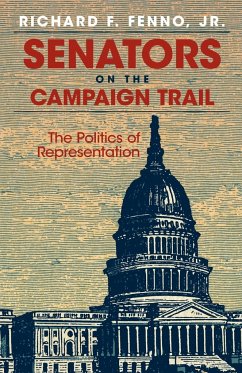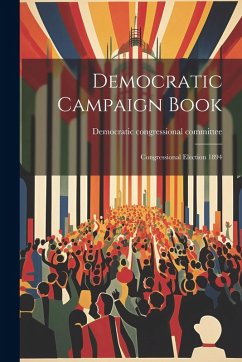
Senators on the Campaign Trail
Versandkostenfrei!
Versandfertig in 1-2 Wochen
30,99 €
inkl. MwSt.

PAYBACK Punkte
15 °P sammeln!
This is a book about the politics of representative democracy, written from the perspective of the politicians who make it work. Typically, political scientists study campaigns from the perspective of the voter and for the purpose of explaining election outcomes. But campaigns also need to be studied from the perspective of the candidate, for the purpose of understanding representation. Richard F. Fenno, Jr., traveled with ten U.S. senators as they campaigned in their home states-using what he calls the ""drop in/drop out, tag along/hang around"" method of research-to present a developmental p...
This is a book about the politics of representative democracy, written from the perspective of the politicians who make it work. Typically, political scientists study campaigns from the perspective of the voter and for the purpose of explaining election outcomes. But campaigns also need to be studied from the perspective of the candidate, for the purpose of understanding representation. Richard F. Fenno, Jr., traveled with ten U.S. senators as they campaigned in their home states-using what he calls the ""drop in/drop out, tag along/hang around"" method of research-to present a developmental picture of their activities. His focus here is on three such activities - pursuing a career, campaigning for office, and building constituency connections. Taken together, the three constitute the political underpinnings of representative democracy. Fenno describes the achievement, the testing, and the maintenance of representational relationships. He examines challengers and incumbents, winners and losers, and motivations, strategies, and behaviors; and he reports on differences, similarities, and patterns among them. In studying the candidates' varied careers, campaigns, and connections in stages and sequences and in depth - and in allowing us to hear them reflect on these experiences - Fenno has been able to offer rare insights into campaigns and elections, insights very different from conventional ones that concentrate on the behavior of voters. In its focus on the process of representative democracy, Senators on the Campaign Trail offers a rich, rounded, developmental view of some high-level individuals who work at the business of representation. For scholars, the book suggests some qualitative confirmation and added stimulation in forging generalizations about politicians. For citizens, the book argues for replacing the conventional blanket condemnation of our politicians, so prevalent today, with more discriminating judgments about what they do, and why and to what purpose they do it.














